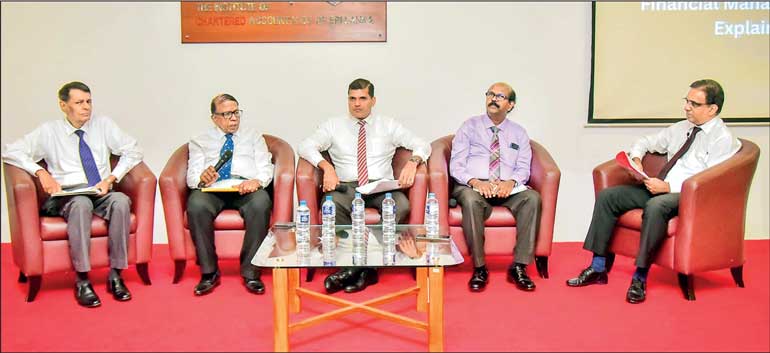Wednesday Feb 25, 2026
Wednesday Feb 25, 2026
Thursday, 6 June 2024 00:00 - - {{hitsCtrl.values.hits}}

The panel comprising V. Kanagasabapathy, Tishan Subasinghe, Committee on Public Accounts Consultant Lalith R. De Silva, and Ministry of Finance, Retired Additional Director General of Public Finance S.U. Chandrakumaran, while the session was moderated by APFASL Secretary Dr. Asela Athapathu
The Institute of Chartered Accountants of Sri Lanka (CA Sri Lanka), together with its public sector wing, the Association of Public Finance Accountants of Sri Lanka (APFASL), organised an insightful session on the proposed Public Financial Management Act of 2024 last week.
The session attracted a large number of public sector accountants, chartered accountants, and senior public officials. The session provided a comprehensive overview of the proposed Public Financial Management Act of 2024, highlighting its potential impact on fiscal discipline and public sector accountability in Sri Lanka.
The special invitees included CA Sri Lanka President Heshana Kuruppu and Vice President Tishan Subasinghe, while the keynote address was delivered by APFASL President V. Kanagasabapathy, whose speech focused on the proposed bill.
The bill aims to enhance fiscal discipline in Sri Lanka’s economic functions, emphasising the management of the budget deficit and debt sustainability. While the bill heavily focuses on controlling the fiscal deficit, it places less emphasis on revenue generation, instead prioritising primary expenditures and capital investments. It proposes the establishment of fiscal limit targets to be achieved through an annual fiscal strategy and a rolling medium-term fiscal framework, aligning the annual budget and budgets of budgetary entities with the fiscal strategy statement.
The bill mandates regular monitoring of mid-year and year-end fiscal position reports and requires entities to produce financial reports according to International Public Sector Accounting Standards (IPSAS), to be presented in parliament within 180 days. Additionally, the bill addresses non-compliance and wasteful expenditures by public sector entities and officers, proposing disciplinary actions and penalties, although these provisions currently lack clear definitions.
Following the keynote address, a panel discussion was held to delve deeper into topics of public interest and gather input for potential improvements of the bill. The panel comprised V. Kanagasabapathy, Tishan Subasinghe, Committee on Public Accounts Consultant Lalith R. De Silva, and Ministry of Finance Retired Additional Director General of Public Finance S.U. Chandrakumaran, while the session was moderated by APFASL Secretary Dr. Asela Athapathu.